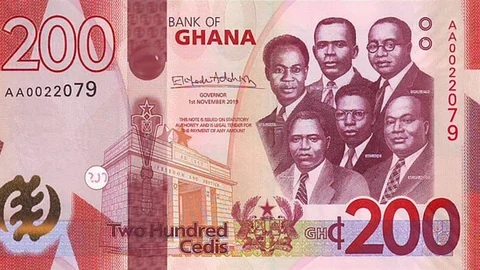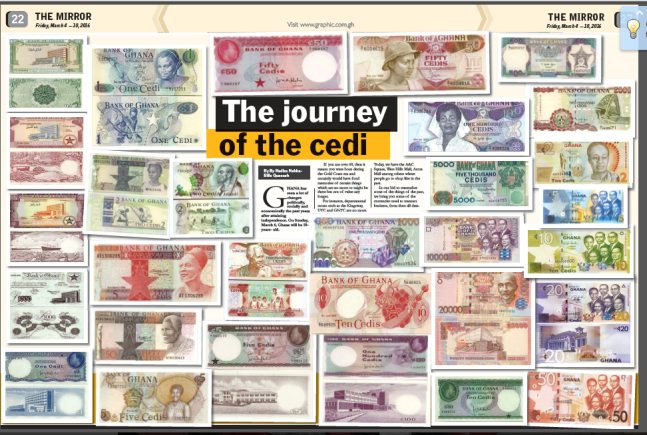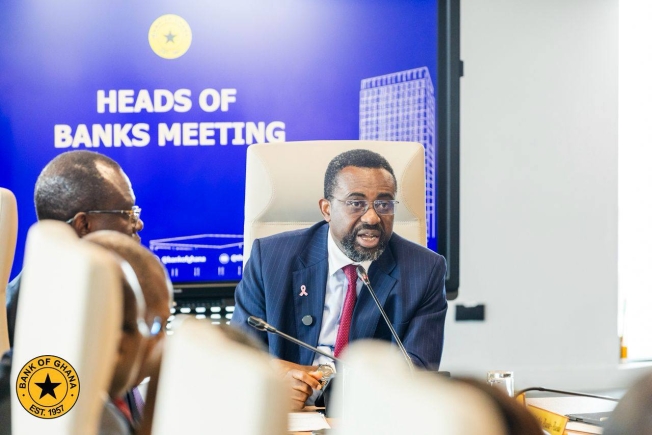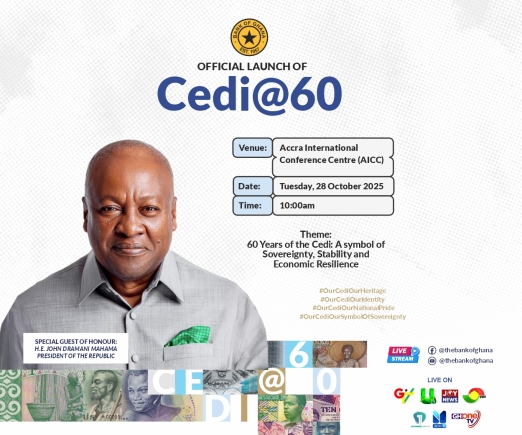The Ghana cedi has appreciated by 37.4% year-to-date (October 17, 2025), making it the best-performing currency in Sub-Saharan Africa in the first eight months of 2025, according to World Bank, the Governor of the Bank of Ghana, Dr. Johnson Asiama, has said.
Governor Asiamah was speaking at the 60th anniversary launch and celebration of the Ghana cedi in Accra on Tuesday morning [Oct 28, 2025].
He reaffirmed the central bank’s commitment to implementing sound policies to maintain exchange rate stability and consolidate recent gains.
"Our gross international reserves stood at about US$10.7 billion as of August 2025, providing a robust cushion against external volatility and restoring investor confidence," he said.
He said headline inflation has dropped sharply to 9.4% as of September 2025, returning to the medium-term target of (8±2) % for the first time in four years.


Attached below is the full copy of the Governor's address
This morning, we gather not only to mark a milestone but to begin a national journey of rediscovery, one that reaches into the past to inform our future.
The Cedi@60 initiative is more than a celebration of longevity. It is a year-long national engagement that will blend public education, policy dialogue, and historical reflection.
Through exhibitions, community forums, lectures, and digital outreach, we hope to bring the story of our currency to every Ghanaian home, from urban centres to remote towns, from classrooms to boardrooms.
For many, the Cedi is something we interact with daily but perhaps do not reflect on deeply.
Yet behind every note and coin lies a history of bold decisions, economic shocks, policy reforms, and the aspirations of a sovereign people.
This initiative seeks to reconnect citizens, young and old, with the role of the Cedi in shaping our economic identity.
Let me be clear: this is not a policy event. It is a moment for Ghana to pause and reflect, not just on what we have built, but on what we must now protect and advance.
This anniversary belongs to all of us. Because when we celebrate the Cedi, we celebrate our journey toward economic self-reliance and national confidence.
THE CEDI’S SIX-DECADE JOURNEY
Sixty years ago, in July 1965, Ghana made a powerful declaration.
We said farewell to the Ghanaian Pound and introduced the Cedi, our very own national currency. In doing so, we were not just changing banknotes. We were affirming that Ghana’s independence must include the ability to define and defend our own monetary destiny.
Since then, the Cedi has gone through many phases…
-
1967, we redenominated to eliminate confusion and strengthen national symbols.
-
In 2007, we introduced the modern Cedi, simplifying transactions, strengthening security, and aligning with global monetary practices.
-
Along the way, we've rolled out security upgrades, commemorative notes, and advanced anti-counterfeiting technologies.
Each transformation, from the integration of advanced security features and commemorative notes to the use of indigenous Adinkra symbols and the portraits of our national heroes, reflects Ghana’s story of resilience, innovation, and pride.
Today, the Cedi is far more than a currency. It is a trusted store of value, a driver of economic activity, and a daily emblem of our collective confidence. Whether exchanged in bustling markets, disbursed as salaries, or saved for future dreams, the Cedi stands as a lasting symbol
of our journey and our unyielding commitment to shape our own destiny.
ECONOMIC CONTEXT AND RECENT POLICY OUTCOMES
Fellow Ghanaians,
The story of the Cedi cannot be separated from the story of our economy. It reflects our moments of bold ambition, our trials under pressure, and our resilience in rebuilding.
In recent years, Ghana, like many other nations, has had to navigate some of the most complex economic storms in a generation. From the lingering effects of the global pandemic, through economic crises, debt exchange, and tightening global financial conditions, our economic
fabric was tested.
But few countries experienced it as acutely as we did.
As of November 2022, the Cedi depreciated by over 50% becoming the World’s worst performing currency in the world according to Bloomberg report. Headline inflation spiralled to 54.1% and food inflation soared to an alarming 59.7% year-on-year in December 2022, distorting household budgets, shrinking incomes, and feeding public anxiety.
These were not just numbers; they were lived experiences. They meant rising transport fares, shrinking working capital, unaffordable school meals, and sleepless nights for small business owners and salary earners alike.
But they were not the end of our story.
Under the leadership of His Excellency John Dramani Mahama, and through coordinated, difficult, but necessary policy actions, Ghana has turned a decisive corner.
And the evidence is compelling:
-
Headline inflation has dropped sharply to 9.4% as of September 2025, returning to the medium-term target of (8±2) % for the first time in four years.
-
The Cedi has appreciated by 37.4% year-to-date (October 17, 2025), making it the best performing currency in Sub-Saharan Africa in the first eight months of 2025, according to World Bank.
-
Our gross international reserves stood at about US$10.7 billion as of August 2025, providing a robust cushion against external volatility and restoring investor confidence.
These gains are not by accident. They are the result of hard, sometimes unpopular, but principled decisions: fiscal consolidation by government, a tight monetary policy stance by the Bank of Ghana, and renewed confidence from the investor community and the Ghanaian public.
And so today, as we celebrate 60 years of the Cedi, we do so not out of nostalgia, but from a place of hard-won stability and cautious optimism.
As your central bank, our mandate remains unchanged: to safeguard price stability, preserve financial system resilience, and support long-term inclusive recovery.
We are not yet where we want to be, but we are no longer where we were.
And that is why this moment–Cedi@60–is not just ceremonial. It is timely. It reminds us of how far we’ve come and challenges us to protect what we have gained.
Let us use this celebration not only to look back, but to chart the path forward, together.
THE CHALLENGES OF MODERN CENTRAL BANKING
Distinguished guests, ladies and gentlemen, As we mark sixty years of the Cedi, we also confront a simple truth: the work of central banking has never been more complex, or more consequential, than it is today. In decades past, monetary authorities operated in a world with slower information flows, clearer transmission channels, and fewer external shocks. Today, the environment is radically
different. Global markets move in milliseconds. Geopolitical uncertainty can cross borders overnight.
And domestic economies are increasingly shaped by global capital, climate disruptions, and digital technologies.
Yet amidst this volatility, the expectations placed on central banks have only grown. We are called upon not only to deliver price stability and currency integrity, but also to guide economies through debt overhangs, manage digital disruption, respond to misinformation, and
support inclusive growth. Our mandate remains the same. But the terrain we navigate is shifting rapidly beneath our feet.
One of the most pressing challenges we face is the growing interplay between fiscal stress and monetary policy autonomy. In many developing countries, including our own, high public debt levels risk undermining the independence of central banks. When fiscal imbalances persist, the pressure to monetize deficits becomes real, and with it, the danger of inflationary drift. This is why restoring and preserving fiscal discipline is not just a government priority; it is a monetary safeguard.
Equally formidable is the digital revolution. Mobile money, fintech platforms, and crypto assets are transforming how people store value, make payments, and access credit. These innovations hold enormous promise for deepening financial inclusion, but they also introduce new risks if left unregulated. That is why the Bank of Ghana has taken proactive steps:
-
We were among the first central banks in Africa to pilot a Central Bank Digital Currency (CBDC)–the eCedi–designed to ensure that our currency remains relevant, secure, and accessible in an increasingly digital economy.
-
Through our regulatory sandbox, we are fostering responsible innovation, allowing startups and financial institutions to test new products under supervision.
-
And with the imminent rollout of a comprehensive regulatory framework for Virtual Asset Service Providers (VASPs), we are positioning Ghana as a regional leader in the safe governance of digital assets.
But let us be clear: technology alone is not enough. What sets a credible central bank apart is not just its tools, but its trustworthiness. In an age of real-time news and speculative sentiment, how we communicate is as vital as what we do. Transparency, predictability, and openness must be embedded in our policymaking. Because when citizens understand not just our actions but our rationale, uncertainty gives way to confidence, and confidence is the anchor of monetary stability.
Over the past few months, the Bank of Ghana has undergone a quiet transformation. We have modernized our supervisory processes, strengthened foreign exchange operations, enhanced payments infrastructure, and deepened our commitment to monetary policy transparency and accountability.
We have also grown more collaborative. We now work closely with the fiscal authority, regulators, academia, and industry stakeholders, because no central bank can deliver economic stability in isolation. Monetary credibility requires fiscal responsibility, public understanding,
and private sector alignment.
In all these efforts, our vision remains steady and clear:
To position the Cedi as a future-ready currency, secure in value, smart in function, and sovereign in spirit.
Let us remember: a currency does not stand strong because it is printed on sturdy paper or minted from polished metal. It stands strong because the people who use it believe in it. That belief is earned, not assumed. It is built daily, through prudent policy, institutional integrity, and shared responsibility.
As we honour the Cedi’s 60-year journey, let us also recommit ourselves to this next frontier, to ensure that the Cedi continues to be a symbol not only of our past, but of our preparedness for the future.
OUTLOOK FOR THE ANNIVERSARY CELEBRATION
As we officially launch the Cedi@60 anniversary, allow me to share a preview of what lies ahead.
This celebration will not be confined to this hall. Over the next 12 months, we will embark on a nationwide and inclusive programme of activities, including:
-
Currency exhibitions that tell the story of our monetary journey, from pounds to pesewas, from coins to QR codes.
-
Public lectures and school tours to engage students, professionals, and communities on the importance of monetary sovereignty.
-
Diaspora engagements, highlighting the role of remittances and international trust in supporting the Cedi’s strength.
-
And special publications and legacy projects to ensure this milestone leaves a lasting educational footprint.
These activities are designed for all age groups, from schoolchildren learning to count with pesewa coins, to fintech entrepreneurs coding the next generation of e-wallets.
We encourage every Ghanaian, home and abroad, to take part. Because the story of the Cedi is the story of us all.
GRATITUDE AND REFLECTION
As we reflect on this journey, it is only fitting to honour those who carried the torch before us.
We salute the vision of our first President, Dr. Kwame Nkrumah, first Governors, and the many men and women who steered this institution through reform, liberalisation, and crisis.
Their foresight, integrity, and dedication laid the foundation on which we stand today.
I must also commend the staff of the Bank of Ghana, past and present whose quiet, professional service continues to safeguard our nation’s economic stability.
To our colleagues at the Ministry of Finance, at commercial banks, in regulatory agencies, and across our financial ecosystem, thank you for your partnership and shared purpose.
And to you, the Ghanaian people, thank you for continuing to believe in your central bank, and in your currency.
Because it is your trust that gives the Cedi its strength. May this celebration renew our shared commitment to a stable, strong, and inclusive economy for all.
Long live the Cedi. Long live the Republic of Ghana.

